
Mindfulness / Meditation Books
The 10 All-Time Favorite Books for Mindfulness and Meditation
These ten books represent the most influential and practical works in mindfulness literature, each having guided millions toward greater awareness and inner peace. From ancient Buddhist wisdom to modern scientific approaches, they form a comprehensive foundation for developing a sustainable meditation practice and mindful way of living.
Each book offers a unique approach to cultivating present-moment awareness—whether through formal meditation, everyday mindfulness, or evidence-based therapeutic techniques. Together, they provide a complete toolkit for anyone seeking to reduce stress, increase focus, and develop the life-changing skill of being fully present, addressing both practical techniques and the profound insights that emerge from consistent practice.
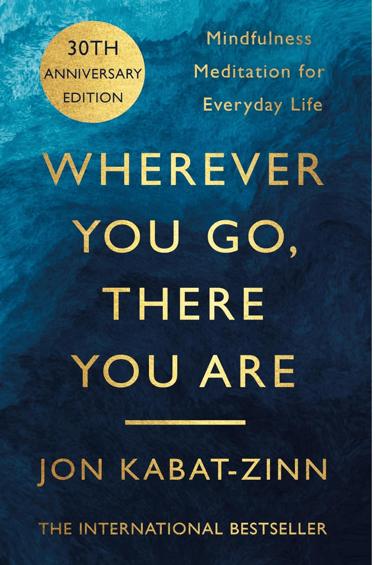

Why you should read it
This book serves as the perfect entry point into mindfulness without any religious baggage or time-consuming commitments. You'll discover how to find moments of peace in ordinary life, understand why mindfulness matters for mental health and happiness, and learn that you don't need to escape your life to find peace - you just need to show up for it. Essential for anyone curious about meditation but worried it's too spiritual, time-consuming, or requires sitting in lotus position.
What we think about this book
Jon's secular approach makes mindfulness accessible to everyone, whether you're a CEO or a student, religious or atheist. His practical exercises are genuinely helpful without being prescriptive, and his scientific background gives credibility without making it dry. The book feels like having a wise friend explain meditation rather than a guru preaching from a mountaintop. Some experienced practitioners might find it too basic, and the pace can feel slow for those wanting quick techniques, but for beginners or skeptics, it's the perfect foundation.
What the book is about
Jon Kabat-Zinn, the scientist who brought mindfulness into mainstream medicine, shows that meditation isn't about sitting in a cave or achieving some special state - it's about being fully present wherever you are. The book explores how to cultivate mindfulness in both formal meditation and everyday life, from washing dishes to dealing with stress at work. He strips away religious trappings to present mindfulness as a practical life skill anyone can develop.
Wherever you go, there you are - Jon Kabat-Zinn
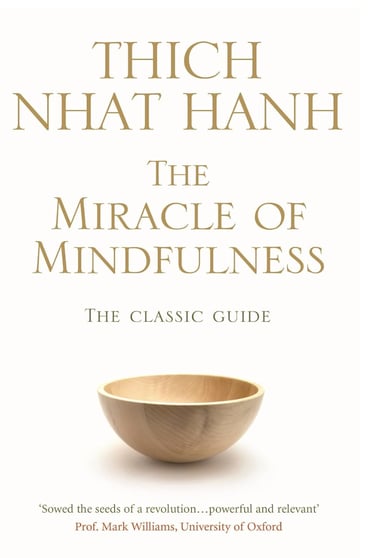

Why you should read it
This book offers mindfulness as a path to peace from someone who found it in the midst of war - if it worked for him, it can work for your daily stress. You'll learn to transform ordinary activities into opportunities for presence, discover the profound in the mundane, and understand how being present for small moments prepares you for life's big challenges. Beautiful for anyone drawn to the spiritual side of mindfulness but wanting practical, real-world application.
What we think about this book
Thich Nhat Hanh's writing is simple yet profound - like poetry that teaches. His gentle approach and timeless wisdom make this a book you'll return to again and again, finding new insights each time. The shortness is deceptive - you could read it in an hour but spend years digesting its wisdom. Very basic for experienced practitioners who might want more advanced techniques, but beginners will find it transformative, and even veterans appreciate its reminder to return to simplicity.
What the book is about
Originally written as a letter to Vietnamese students during the war, this slim book teaches mindfulness through the simplest activities - eating an orange, washing dishes, drinking tea. Thich Nhat Hanh, a Zen master who worked for peace during the Vietnam War, shows how any moment can become a moment of awakening if you're truly present. He presents meditation not as an escape from life but as a way to fully engage with it, even in the midst of chaos.
The Miracle of Mindfulness - Thich Nhat Hanh
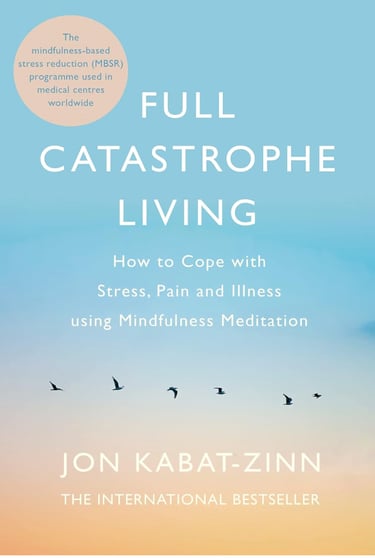

Why you should read it
This book provides the complete MBSR program that's helped thousands heal from chronic conditions - it's like taking the actual course from home. You'll get evidence-based techniques for using mindfulness to work with pain, illness, and stress, understand the mind-body connection through scientific research, and learn a systematic approach to developing a sustainable meditation practice. Invaluable for anyone dealing with health challenges, chronic pain, or wanting the full scientific approach to mindfulness.
What we think about this book
This is the most comprehensive, evidence-based guide available, with serious medical credibility that makes it recommendable even by skeptical doctors. Jon covers everything in detail with a structured program that takes the guesswork out of developing a practice. The scientific backing and patient stories make it compelling for those who need proof that this stuff works. However, it's long and can feel clinical in tone - more textbook than inspirational read. Some might find it overwhelming or too medical. Best for those who want the full course experience or are dealing with specific health issues.
What the book is about
This is Jon Kabat-Zinn's comprehensive guide to his groundbreaking MBSR (Mindfulness-Based Stress Reduction) program - the 8-week course that's been scientifically studied for decades and helped thousands heal from chronic pain, illness, and stress. The book walks you through the entire program with detailed instructions for body scan meditation, mindful yoga, sitting meditation, and working with difficult emotions. He backs everything with research while sharing real stories from patients who've used these techniques to transform their relationships with pain and illness.
Full Catastrophe Living - Jon Kabat-Zinn
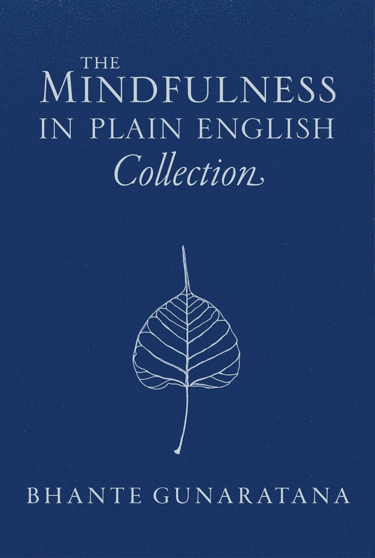

Why you should read it
This book demystifies meditation like no other, explaining the actual mechanics of what you're doing and why. You'll learn the crucial difference between concentration and mindfulness, understand why your mind wanders (and why that's okay), and get honest guidance about the difficulties everyone faces. It's particularly valuable for skeptics who want the benefits of meditation without the religious packaging or new-age terminology.
What we think about this book
Bhante G's straightforward approach makes this possibly the best meditation manual ever written. He manages to be both precise and warm, technical yet accessible. The book addresses real problems with real solutions - no vague platitudes here. While some might find it less poetic than other meditation books, its clarity is unmatched. If you want to actually understand meditation rather than just follow instructions blindly, this is your book.
What the book is about
Written by a Sri Lankan Buddhist monk with decades of teaching experience, this book strips meditation down to its essentials without any mystical fluff. Bhante G explains Vipassana (insight) meditation in remarkably clear language, addressing the real problems meditators face - from dealing with pain to handling distracting thoughts. He breaks down exactly what happens in your mind during meditation and provides practical solutions for common obstacles that make most people quit.
Mindfulness in Plain English - Bhante Henepola Gunaratana
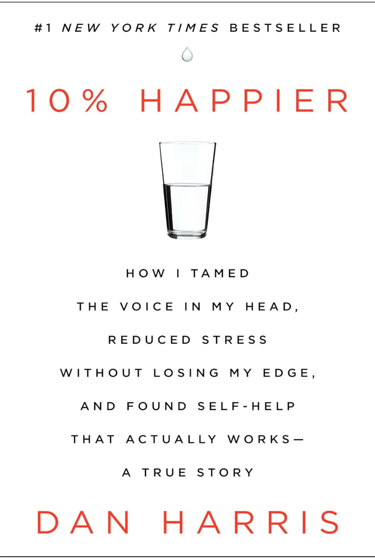

Why you should read it
If you've ever thought meditation is too woo-woo or that you're too Type-A to sit still, this book is for you. Harris approaches meditation like an investigative reporter, questioning everything and calling out the BS. You'll learn how meditation can make you more focused and less reactive without turning you into a blissed-out zombie. His "10% happier" promise is refreshingly modest and achievable - no enlightenment required.
What we think about this book
Dan Harris makes meditation accessible to skeptics in a way few authors manage. His self-deprecating humor and journalistic approach strip away the mysticism while preserving the benefits. The book is genuinely funny while tackling serious topics like ambition, addiction, and anxiety. Some experienced meditators might find his approach too basic, but for stressed-out professionals who think they're too busy to meditate, it's perfect.
What the book is about
ABC news anchor Dan Harris had a panic attack on live television in front of millions. This humiliating moment launched him on an unlikely journey into meditation, despite being a skeptical, ambitious journalist who thought meditation was for hippies. The book chronicles his exploration of Buddhism, self-help culture, and neuroscience, ultimately finding a practical approach to meditation that doesn't require you to join a commune or give up your edge.
10% Happier - Dan Harris
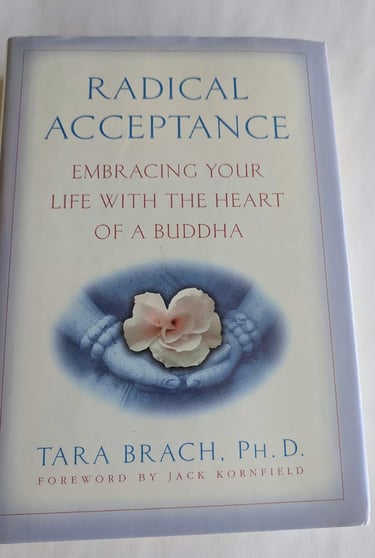

Why you should read it
This book addresses the epidemic of self-judgment that plagues modern life, offering a genuine path to healing. You'll learn the RAIN technique (Recognize, Allow, Investigate, Nurture) for working with difficult emotions, understand how to break free from addictive patterns, and discover how accepting yourself paradoxically creates space for real change. It's essential for anyone struggling with shame, perfectionism, or feeling fundamentally flawed.
What we think about this book
Tara Brach's combination of psychological insight and spiritual wisdom creates something truly transformative. Her writing is both compassionate and practical, never shying away from real suffering while offering genuine hope. The personal stories and case studies make abstract concepts tangible and relatable. Some readers might find the Buddhist elements challenging if they're not spiritually inclined, but Brach presents them in such an accessible way that most will find value regardless of their beliefs.
What the book is about
Clinical psychologist and Buddhist teacher Tara Brach explores how we get trapped in a trance of unworthiness, constantly judging ourselves as not good enough. She combines Western psychology with Buddhist meditation practices to show how radical acceptance - fully embracing our lives and ourselves with compassion - can free us from this painful cycle. The book includes guided meditations, personal stories from her therapy practice, and practical techniques for developing self-compassion.
Radical Acceptance - Tara Brach
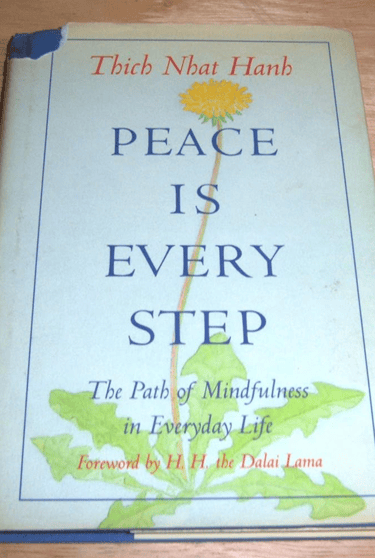

Why you should read it
This book revolutionizes how you think about mindfulness - it's not something you do for 20 minutes on a cushion but a way of living every moment. You'll learn practical techniques like walking meditation, mindful breathing, and how to transform negative emotions through understanding. Thich Nhat Hanh's teachings are especially powerful for finding peace during conflict and maintaining compassion in difficult relationships.
What we think about this book
Thich Nhat Hanh's gentle wisdom feels like a balm for our chaotic world. His writing is deceptively simple - you might read a passage quickly, then realize it contains profound truth requiring deep contemplation. The book's strength is making mindfulness feel natural and accessible rather than another thing to achieve. Some might find it too gentle or prefer more structured instruction, but its poetic approach touches hearts in ways that technical manuals cannot.
What the book is about
Vietnamese Zen master Thich Nhat Hanh shows how to find peace and joy in the most ordinary moments - washing dishes, answering the phone, even sitting in traffic. Written with the simplicity of poetry, the book teaches that meditation isn't separate from daily life but woven through every activity. Each short chapter offers a gentle teaching about transforming anger, dealing with difficult people, or finding beauty in simple things like breathing or walking.
Peace Is Every Step - Thich Nhat Hanh
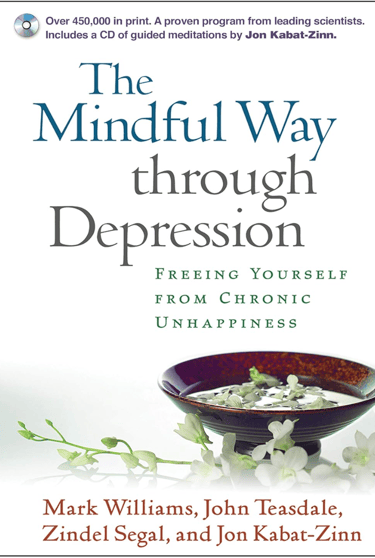

Why you should read it
If you've experienced depression or chronic unhappiness, this book offers scientifically-proven tools that actually work. You'll understand why trying to think your way out of depression often makes it worse and learn how to relate differently to negative thoughts. The approach doesn't promise to eliminate sad feelings but teaches you to prevent normal sadness from spiraling into depression. It's also valuable for therapists and anyone supporting someone with depression.
What we think about this book
This book achieves the rare combination of scientific rigor and practical accessibility. The authors explain complex neuroscience clearly while maintaining warmth and compassion. The 8-week program is well-structured and the included audio meditations are excellent. While it's specifically focused on depression, the techniques benefit anyone dealing with difficult emotions. Some readers might find the clinical tone less engaging than other mindfulness books, but for those wanting evidence-based approaches, it's unmatched.
What the book is about
Four leading researchers combine cognitive therapy with mindfulness meditation to create a powerful approach to preventing depression relapse. The book explains how depression works in the brain, why traditional positive thinking often backfires, and how mindfulness can break the cycle of rumination that feeds depression. It includes an 8-week program with guided meditations that teaches you to observe thoughts and feelings without getting caught in them.
The Mindful Way Through Depression - Williams, Teasdale, Segal, Kabat-Zinn
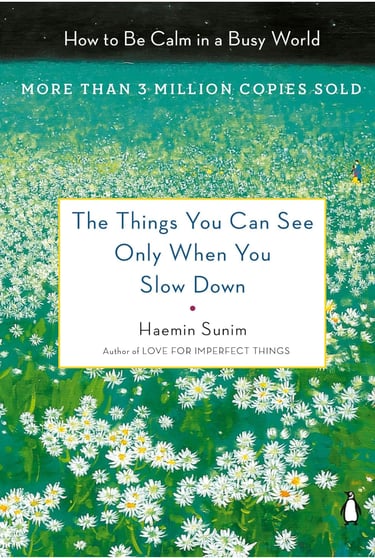

Why you should read it
This book is medicine for anyone feeling overwhelmed by the pace of modern life. You'll discover how slowing down actually helps you accomplish more, why self-compassion is more powerful than self-improvement, and how to find calm in chaos. Haemin's insights blend Buddhist wisdom with practical psychology, making ancient teachings relevant for dealing with social media, work stress, and modern relationships.
What we think about this book
Haemin Sunim has created something beautiful - a book that feels like a meditation in itself. The short chapters make it perfect for busy people, while the depth of wisdom rewards slow contemplation. His voice is refreshingly modern for a Buddhist teacher, addressing real contemporary struggles. Some might find it too simple or want more detailed instruction, but its gentle approach and visual beauty make it a book you'll return to repeatedly for comfort and clarity.
What the book is about
Korean Zen Buddhist teacher Haemin Sunim offers gentle wisdom for our hyperconnected, always-rushing world. Through brief, contemplative chapters paired with simple illustrations, he explores themes like relationships, work, spirituality, and finding peace in modern life. Each page invites you to pause and reflect, whether discussing how to handle criticism, find your calling, or simply appreciate a cup of tea.
The Things You Can See Only When You Slow Down - Haemin Sunim
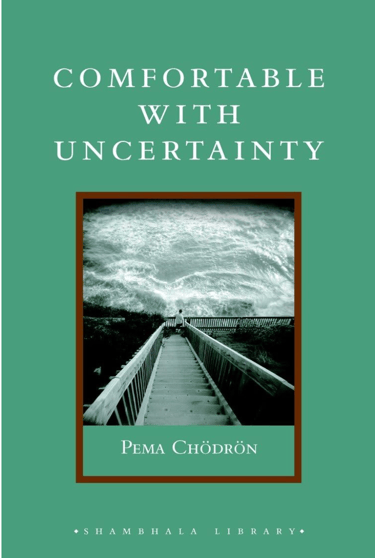

Why you should read it
In a world that constantly pushes us to seek security and control, this book teaches the radical practice of relaxing with uncertainty. You'll learn how to stop running from discomfort, transform anxiety into openness, and develop genuine confidence that doesn't depend on external circumstances. Each teaching is bite-sized but profound, perfect for daily contemplation or turning to when life feels overwhelming.
What we think about this book
Pema Chödrön has an extraordinary gift for making Buddhist teachings feel like advice from a wise, compassionate friend. Her approach to uncertainty is both challenging and comforting - she doesn't sugarcoat life's difficulties but shows how to find freedom within them. The short-teaching format makes this incredibly practical for busy people or those new to Buddhism. While some concepts require sitting with discomfort that readers might initially resist, those who stick with it find genuine transformation in their relationship with life's unpredictability.
What the book is about
American Buddhist nun Pema Chödrön presents 108 short teachings on developing fearlessness and compassion in the face of life's uncertainty. Each teaching, just a page or two long, explores how to work with difficult emotions, embrace change, and find peace with not knowing. She draws from Tibetan Buddhism but makes the concepts completely accessible, showing how to use life's challenges as opportunities for awakening rather than sources of suffering.
